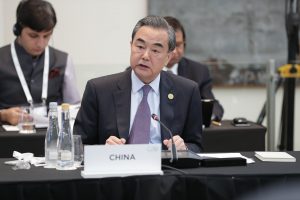China’s Foreign Minister Wang Yi will host his counterparts from four maritime Southeast Asian nations this week, stepping up Beijing’s attempts to engage the region in the wake of diplomatic efforts by the United States and its partners.
Foreign Ministry Spokesperson Hua Chunying said in a press conference in Beijing yesterday that the foreign ministers of Singapore, Malaysia, Indonesia, and the Philippines had been invited to visit China from March 31 to April 2. She described the meetings as a sign of “the profound friendship and growing affinity” between China and its neighbors in Southeast Asia.
A separate statement from Singapore’s Foreign Ministry announcing the meeting suggests that it will take place in the Chinese province of Fujian, stating that the city-state’s top diplomat Vivian Balakrishnan was scheduled to visit on March 30-31. There was no indication whether the meetings will be bilateral, or whether it will take the form of a mini-summit, although usual Chinese practice (and the differential timing of Balakrishnan’s visit) would seem to suggest the former.
The invitation to the four maritime Southeast Asian nations comes amid a fresh spate of tensions in the South China Sea. Last week, China dispatched around 200 ships to Union Banks in the Spratly Islands. Most of the flotilla is moored around the Whitsun Reef, a low-tide elevation that the Philippines claims falls within the country’s 200-nautical-mile Exclusive Economic Zone, over which the Philippines “enjoys the exclusive right to exploit or conserve any resources” under international law.
While China claims that the vessels are merely fishing boats that are sheltering from adverse weather conditions, the ships include at least seven vessels belonging to the People’s Armed Forces Maritime Militia. Today, the Philippines Inquirer reported that the Chinese fleet in the area instructed a Philippine military aircraft conducting an aerial patrol to “leave immediately” as it flew over Whitsun Reef.
The U.S. has condemned the Chinese deployment to Whitsun Reef, accusing China of using “maritime militia to intimidate, provoke, and threaten other nations, which undermines peace and security in the region.” During security talks in Tokyo yesterday, the foreign and defense ministers of Japan and Indonesia similarly expressed their “grave concern over the continuation and escalation of an attempt to change the status quo by force.” The two nations also signed an agreement allowing for the export of Japanese military technology to Indonesia, which follows similar pacts with Vietnam and the Philippines, two other South China Sea claimants.
All this has taken place against a backdrop of increasing coordination between the U.S. and its partners in Asia. On March 12, U.S. President Joe Biden hosted a virtual summit with the leaders of the Quad grouping, which also includes Japan, India, and Australia. The meeting, the first of its kind, was a sign that the Quad grouping, which a Chinese official once claimed would dissipate like “sea foam,” has gained momentum since its resurrection by the Trump administration. As my colleague Abhijnan Rej noted at the time, the summit offered an indication that this momentum “is far from being spent.”
At the close of the meeting, the four Quad nations issued a joint statement pledging themselves to create “a region that is free, open, inclusive, healthy, anchored by democratic values, and unconstrained by coercion.” It also held out the possibility of “collaboration, including in maritime security, to meet challenges to the rules-based maritime order in the East and South China Seas” – code for China’s increasingly disruptive actions in the region.
The Fujian meetings shape as the return leg of two diplomatic trips that Wang took to Southeast Asian nations in October 2020 and January of this year, which collectively took him to every member of the Association of Southeast Asian Nations (ASEAN) bar Vietnam. (He also held talks with Vietnamese Foreign Minister Pham Binh Minh in Guangxi province in August 2020.)
As with these earlier diplomatic forays, the proximate aim of China’s invitations to the four nations will be to coordinate COVID-19 recovery efforts, particularly the distribution of Chinese-made vaccines to the four nations and push forward infrastructure projects under the Belt and Road Initiative.
There is also a chance that the talks will address the escalating crisis in Myanmar, where violent crackdowns on anti-coup protesters have been matched by increased fighting in the borderlands. Among the member states of ASEAN, Singapore, Malaysia, and Indonesia have been the most active pushing for a greater efforts by the bloc to resolve the situation in Myanmar, calling last week for an emergency ASEAN summit aimed at resolving the issue. Given its proximity to Myanmar and its extensive economic interests in the country, China will be central to any diplomatic attempt to resolve the crisis.
As on Wang’s earlier diplomatic forays to the region, the broader aim of the meetings will be to position China as an enduring and reliable partner of the Southeast Asian countries, at a time in which the pandemic recession has made the region more economically reliant on China than ever before. He will no doubt emphasize that the Biden administration has, during its first steps in Asian diplomacy, chosen to focus on the consolidation of the Quad, and ties with East Asian treaty allies like Japan and South Korea, over Southeast Asia.
Ultimately, however, Southeast Asian nations have good reasons to maintain stable relations with both China and the United States as their strategic rivalry deepens and develops. As Indonesia’s recent arms export agreement with Japan suggests, most have proven adept at navigating between the shoals of great power rivalry – at least for now.

































